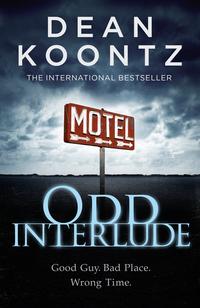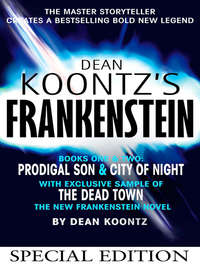
Полная версия
Relentless
If Waxx made subtle sounds, I was not certain that I could hear them above this inner drumming. The rhythmic pressure waves of hard-pumped blood raised surf sounds in the nautilus turns of my inner ears.
The longer Waxx waited to speak again, the more I wondered what his game might be. I had no doubt that he had come here to harm us. That he wanted first to terrorize us seemed obvious, as well. But his boldness, the risks he took, and his eerie patience in the dark gave me the impression that his purpose was more complex than the psychotic thrill of torment and murder.
Before he spoke again, and especially before he switched on a flashlight, I needed to put some distance between myself and the bed. He would expect to find me there, and when he did not, when his light revealed his position but not mine, I might be able to catch him off guard, rushing at him from the side or from behind as he initially regarded the tangle of abandoned sheets.
Crouched and barefoot, in a slow-motion shamble that required tension in every muscle and that tested balance, I ape-walked toward where I expected to find an armchair. It ought to be just to the right of that point on the wall where the alarm-system keypad should have been softly glowing.
Shoulders slumped, arms low, I let my fingertips slide lightly, soundlessly across the carpet. If a knee buckled or a muscle cramped, I could steady myself with my hands.
I feared making a sound less than I dreaded colliding with Waxx in the blackness. My strategy would then be worthless, though I would still surprise him and might be able to overpower him before he shot or stabbed me.
I am five feet eleven and in acceptable physical condition. But I did not delude myself that his formidable bulk would prove to be flab. He would be difficult to take down.
In retrospect, I realize that in my desperation, I thought I could plot the scene as if I were writing fiction. Suspense novels are not my genre. Fate had dropped me into a real-life tale of peril, however, and because I lacked tough-guy experience, I had fallen back on imagination and craftsmanship to sculpt this narrative toward a twist that would not leave me dead in an early chapter.
Blinded, I nevertheless found the armchair where I expected it would be, which gave me hope that I remained the protagonist and had not become a supporting character destined for a bloody end in Part 1.
Elsewhere in the room, his position impossible to fix from a single word, the critic said quietly, “Hack.”
He might be describing what he intended to do to me with an axe or cleaver, but I suspected that instead the word was intended as an insult, a judgment of my writing skills.
Separating the first armchair from another was an art-deco sideboard. The highly lacquered amboina wood felt cool against my fingertips as I aped onward.
Our sleigh bed stood against the east wall of the room. Logic suggested that Waxx had positioned himself at the foot of the bed, where his flashlight, when he switched it on, could cover both me and Penny.
Now near the south wall, I hoped to circle to the west, where I most likely would be behind him when at last he revealed himself.
Wondering at Waxx’s failure to take quick and deadly action after penetrating the house so effectively, I halted at the second armchair, suddenly fearful of proceeding. I began to suspect that I had missed something, that the implicit meaning of the moment was different from what I imagined it to be.
This happens often when writing fiction. Outlines are a waste of time. If you give your characters free will, they will grow in ways you never anticipated, and they will take the story places you could not have predicted, raising themes you might or might not have intended to explore. Characters shape events; events illuminate the characters. The people in a story begin as seeds, become buds, and blossom in ways that surprise the author, precisely as real people frequently surprise him with their intentions and capacities.
As I crouched by the second armchair, Shearman Waxx electrocuted me.
Chapter 11
Out of the darkness, something thrust against the nape of my neck—two metal pegs, positive and negative poles. Before I could flinch away, hot needles stitched the length of my spine and then sewed through every branch of my peripheral nervous system to toes, to fingertips, to scalp.
My eyes rolled back in my skull, dazzled by an inner vision of gold and crimson fireworks, and I dropped out of my crouch. Facedown on the carpet, I twitched as a puppeteer jerked on the threads that the needles had sewn through me.
The words that came from me were none that I intended, slurred and meaningless.
Although coherent speech eluded me, I clearly heard Penny, who had been awakened by my cry.
“Cubby?” The click-click of her lamp switch. “What’s happening?”
I resisted the twitching, but spasmed all the more for my resistance. Yet I marshalled the clarity of mind and tongue to tell her what seemed most important: “He can see in the dark.”
The bronze hardware on her nightstand rattled as Penny jerked open drawers in search of the flashlight that Waxx had confiscated.
She let out a thin shriek, like the plaint a bird in flight might issue if pierced by an arrow. The hard knock of her fall suggested that she might have struck her head on furniture.
The physical effects of the shock faded quickly. The twitching diminished to a nervous trembling, which was not a consequence of extreme voltage but an expression of my terror at Penny’s suffering.
From full collapse, I rose onto all fours, then to my knees, my mind a jigsaw-puzzle box full of fragmented thoughts from which I could not fit together a defensive tactic.
The word Taser sizzled into my mind. And Waxx Tasered me again.
I fell from my knees onto my right side. My skull rapped the floor. I bit my tongue, tasted blood.
For a moment, I thought Waxx was tearing at my pajama shirt, but the clawing hands were mine. I tried to close them into fists.
Stuttering Penny’s name, infuriated by my inability to protect her, I tried to jackknife off my side, onto my knees. The post-shock spasms facilitated this change of position. Probing the darkness, I found an armchair, used it for support, got to my feet.
I cursed myself that I was not prepared for this—not for Waxx in particular, but for someone lethal in the night. I knew well the capacity for cruelty in the human heart.
A groan of convulsive misery came from Penny as she was Tasered a second time.
A homicidal rage, of which I would never have imagined myself capable, focused me. Murderous fury more than terror cracked the dam of adrenaline, flooding me with sudden strength, animal determination.
I moved unsteadily toward where I thought Penny might be.
As invisible as the wind—and like the wind revealed only by his effects—Waxx came in from my left side, stinging me in the neck. The shocks were no longer hot but as cold as driven sleet.
Although I struck him, it seemed to be a glancing blow. My legs buckled, and I knew I would not get another chance to hit him.
As I struggled to stay on my hands and knees, he bent down and Tasered me a fourth time, again on the nape of the neck.
I lay prone and shaking, a coiled snake of nausea flexing in my gut. My mouth flooded with saliva, and I thought I would vomit.
He Tasered me again before the previous shock had begun to wear off. I wondered if the effects were cumulative, if enough of them could fry the nerves, induce a stroke, cause death.
He spoke only one more word to me: “Scribbler.”
For a while, I seemed to be floating in the blackness of deep space, the floor under me no longer a floor but a spiral galaxy slowly turning.
My sense of time had been temporarily short-circuited. When I discovered that I had the capacity to crawl, and in fact to rise to my feet, I did not know whether one minute or ten had passed since my last Tasering.
I was surprised to be alive. If, like a cat, I had nine lives, I had used up eight of them one night a long time ago.
The taste of blood remained from my bitten tongue, yet when I called Penny’s name, my voice broke as if my mouth and throat were not only dry but desiccated.
She did not answer.
Chapter 12
Waxx must have taken Penny with him, to what purpose I could imagine, to what end I refused to consider.
One moment more of blindness was intolerable. Faint moonglow at the edges of the blackout draperies led me to the windows. I found the cord, revealed the glass, the night, the looming lunar face.
“Cubby?”
Either she had been unconscious when I called to her or she had not heard me because my voice was even weaker than I thought.
After the unrelieved gloom, the merest moonlight was sunshine to my eyes, and I saw her pulling herself to her feet at the dresser.
I went to her, speechless with gratitude. Her breath against my throat, the graceful curve of her back under my right hand, and the sweet smell of her hair were poetry that words could never equal.
She said the only thing worth saying: “Thank God.”
On the nightstands, the digital clocks came back to life and began flashing to indicate that they needed to be reset.
The alarm keypad brightened. A yellow indicator light announced a functioning system, and a red bulb confirmed that it was armed.
The recorded voice that reported on status changes remained silent, as though the alarm had never been disabled.
Neither Penny nor I said “Milo,” but we hurried to his room, switching on lights as we went.
As my hand closed on the knob, a growl rose from the far side of the door. Lassie greeted us with raised hackles and bared teeth. As if we were not the real Penny and Cubby but evil replicants, she continued to threaten violence if we crossed the threshold.
Dogs have a sense of shame, in fact stronger than most people do these days. Penny played to it, disappointment in her voice: “Growling at me but not one bark to warn us about that lunatic?”
Lassie stopped growling but continued to bare her teeth.
“Not one bark for the lunatic?” Penny repeated.
The dog’s flews quivered with what seemed to be embarrassment and relaxed to cover her teeth. Her tail wagged tentatively.
I came to Lassie’s defense: “She was ready to protect Milo. Good girl.”
The boy lay in bed, snoring softly. He didn’t wake when Lassie sprang onto the mattress and curled beside him.
“Stay here,” I whispered. “I’ll search the house.”
Voice hushed but adamant, Penny said, “Not alone. Call the cops.”
“It’s all right. He’s gone. I’m just making sure.”
“Don’t be ridiculous. Call the cops.”
“And tell them what? Did you see Waxx?”
“No. But—”
“I didn’t see him, either.”
Her eyes narrowed. “He said something, a word.”
“Three words. Doom. Hack. Scribbler.”
She bristled. “He called you a hack?”
“Yeah.”
“He should die hard. Point is—you heard him speak at the restaurant.”
“Only one word. I hardly know his voice.”
“But you know this was him.”
“Evidence, Penny. Isn’t any.”
She pointed to a pair of red marks on her left forearm, like two spider bites. “The Taser.”
“That’s not enough. That’s nothing. How often did he sting you?”
“Twice. You?”
“Five, maybe six times.”
“I’d like to castrate him.”
“That doesn’t sound like the creator of the Purple Bunny books.”
“Call the cops,” she insisted.
“He’ll say we made it up, to get back at him for his review.”
“He didn’t review me. Why am I going to lie about him?”
“For me. That’s what they’ll say. You know the media—if you give them a stick, they love to knock you down.”
I couldn’t say there was an event in my past about which I never told her. If I made accusations about Waxx that he denied, tabloid TV would start digging. They probably wouldn’t be able to learn who I had been, as a child, but I didn’t want to test their skills.
I said, “Besides, I have a feeling like…he wants us to call the cops.”
“Why would he want that?”
“Either he wants us to call them or he doesn’t care if we do. This is so screwy. I haven’t done anything to him. There’s something about this we don’t understand.”
“I don’t understand any of it,” she declared.
“Exactly. Trust me on this. No cops just yet.”
Leaving her with Milo and the dog, I searched the house, found no one. Nothing had been damaged. Everything seemed to be in order.
All the doors were locked, and the security chains were engaged. The window latches were secure. No panes had been broken.
Christmas was little more than six weeks away; but Waxx had not come down a chimney and had not departed through one. All the dampers were closed tight.
In the master bathroom, I stripped off my pajamas and quickly dressed. I retrieved my wristwatch from the vanity, where I had left it before retiring for the night. The time was 4:54 A.M.
Catching sight of myself in a mirror, I didn’t like what I saw. Face pale and damp with sweat, skin gray and grainy around the eyes, lips bloodless, mouth tight and grim.
My eyes were especially disturbing. I didn’t see myself in them. I saw someone I had once been.
When I returned to Milo’s room, he still slept.
Lassie had gotten over her shame. From the bed, she stared at us imperiously and issued a long-suffering sigh, as though we were keeping her awake.
Penny said, “I’m gonna scream if I don’t have a cookie.”
Chapter 13
This time: oatmeal-raisin with macadamia nuts.
Penny was too agitated to sit at the table. She paced the kitchen as she nibbled the cookie.
“You want milk?” I asked.
“No. I want to blow up something.”
“I’m having Scotch. Blow up what?”
“Not just a tree stump, that’s for sure.”
“We don’t have any stumps. Just trees.”
“Like a hotel. Something at least twenty stories.”
“Is that satisfying—blowing up a hotel?”
“You’re so relaxed afterward,” she said.
“Then let’s do it.”
“We blew up a church once. That was just sad.”
“I’m angry and scared. I don’t need sad on top of that.”
I sat on a stool, my back to the breakfast bar, and watched her pace as I sipped the Scotch. The whiskey was just a prop; what calmed and fortified me was watching Penny.
“Blowing things up,” she said, “relieves stress better than cookies.”
“Plus it’s less fattening,” I noted, “and doesn’t lead to diabetes.”
“I’m thinking maybe we’ve made a mistake not involving Milo in all that.”
“I’m sure he’d enjoy blowing up buildings. What kid wouldn’t? But what about the effect on his personality development?”
“I turned out okay, didn’t I?” she asked.
“So far, you’re the nicest abnormal person I know. But if the cookies stop working for you…”
Grimbald, her father, was a demolitions expert. In Las Vegas alone, he had brought down four old hotels to clear the land for bigger and glitzier enterprises. From the time Penny—then Brunhild—was five years old until she married me, he had taken her with him to watch his controlled blasts implode enormous structures.
On a DVD that her folks produced for us, we have TV-news footage of young Penny at numerous events, clapping her hands in delight, giggling, and mugging for the camera as, behind her, huge hotels and office buildings and apartment towers and sports stadiums collapsed into ruins. She looked adorable.
Grimbald and Clotilda titled the DVD Memories, and for the soundtrack they used Streisand singing “The Way We Were” as well as an old Perry Como tune, “Magic Moments.” They got teary-eyed when they played it every Christmas.
“I’ve learned something about myself tonight,” Penny said.
“Oh, good. Then it’s all been worthwhile.”
“I didn’t know I could get this pissed off.”
Penny dropped her half-eaten cookie in the kitchen sink.
“Uh-oh,” I said.
With a spatula, she shoved the cookie into the drain. She turned on the cold water, and then she thumbed the garbage-disposal button.
In an instant, whirling steel obliterated the cookie, but she did not at once push the button again. She stared at the drain as the water spilled down through the churning blades.
I began to suspect that in the theater of her mind, she was feeding pieces of Shearman Waxx to the disposal.
After a minute, I raised my voice to be heard above the motor, the whistling blades, and the running water: “You’re beginning to freak me out.”
Shutting off the disposal and the water, she said, “I’m freaking myself out.” She turned away from the sink. “How could he see in the dark?”
“Maybe night-vision goggles, the infrared spectrum.”
“Sure, everybody has a pair of those lying around. So how could he take control of our alarm system?”
“Babe, remember when we got a car with a satellite-navigation system? The first day, I kept responding to the woman who was giving me directions because I thought she was talking to me live from orbit?”
“Okay, I’m asking the wrong guy. But you’re the only guy I’ve got to ask.”
As I started to reply, Penny put a finger to her lips, warning me to be silent.
Cocking my head, listening to the house, I wondered what she had heard.
She came to me, took my glass of Scotch, and put it on the counter.
Raising my eyebrows, I silently mouthed the question What?
She grabbed my hand, led me into the food pantry, closed the door behind us, and said sotto voce, “What if he can hear us?”
“How could he hear us?”
“Maybe he bugged the house.”
“How could he have done that?”
“I don’t know. How did he take control of our alarm system?”
“Let’s not get totally paranoid,” I said.
“Too late. Cubby, who is this guy?”
The standard online encyclopedia answer that had been adequate only a day earlier—award-winning critic, author of three college textbooks, enema—no longer seemed complete.
“After his weird walk-through yesterday,” Penny said, “I told you it was over, he’d made his point. But it wasn’t over. It still isn’t.”
“Maybe it is,” I said with less conviction than a guy cowering in the rubble of a city only half destroyed by Godzilla.
“What does he want from us? What do you think?”
“I don’t know. I can’t figure how his head works.”
Her eyes were no less lovely for being haunted. “He wants to destroy us, Cubby.”
“He can’t destroy us.”
“Why can’t he?” she asked.
“Our careers depend on talent and hard work—not just on a critic’s opinions.”
“Careers? I’m not talking about careers. You’re in denial.”
For some reason—maybe to avoid her gaze—I plucked a can of beets off a pantry shelf. Then I didn’t know what to do with it.
“In the mood for beets?” she asked. When I returned the can to the shelf without comment, she said, “Cubby, he’s going to kill us.”
“I didn’t do anything to him. Neither did Milo. You haven’t even seen him yet.”
“He has some reason. I don’t much care what it is. I just know what he’s going to do.”
I found myself looking at a can of corn, but I didn’t pick it up. “Let’s be real. If he wanted to kill us, he could have done it tonight.”
“He’s sadistic. He wants to torment us, terrify us, totally dominate us—and then kill us.”
I was surprised by the words that came from me: “I’m not a magnet for monsters.”
“Cubby? What does that mean?”
I know Penny so well that her tone of voice told me precisely what expression now shaped her face: furrowed brow, eyes squinted in calculation, nose lifted as if to catch a scent, lips still parted in expectation after she had spoken—the quizzical look of an acutely perceptive woman who recognizes a moment of revelation hidden in the folds of a conversation.
“What does that mean?” she repeated.
Rather than lie to her, I said, “I think I should apologize.”
“Are you talking to me or the corn?”
I dared to look at her, which was not easy considering what I said as I met her eyes: “I mean—apologize to Waxx.”
“Like hell. You don’t have anything to apologize for.”
“For going to lunch just to get a look at him.” I couldn’t explain myself to her. For ten years, I deceived her by omission, and now was not the time to confess. “For violating his privacy.”
Incredulous, she said, “It’s a public restaurant. This is a. private residence. You looked at him, he Tasered us.”
“An apology can’t do any harm.”
“Yes, it can. An apology won’t placate him. It’ll encourage him. He’ll feed on any concession. Apologizing to such a man—it’s like baring your throat to a vampire.”
Hard experience supported what she said, but it was experience that I had long repressed and on which I was loath to act.
“All right,” I said. “So what do you think we should do?”
“Locks and alarms didn’t stop him tonight. They won’t stop him tomorrow night. This place isn’t safe.”
“I’ll have the alarm company upgrade the system.”
She shook her head. “That’ll take days. And it won’t matter. He’s too clever for upgrades. We have to get to a safe place, where he can’t find us.”
“We can’t run forever. I’ve got a book deadline.”
“And, good golly,” she said, “we haven’t even begun to do our Christmas shopping.”
“Well, I do have a deadline,” I said defensively.
“I didn’t say run forever. Just buy time to do some research.”
“What research?”
“Shearman Waxx. Where does he come from? What’s his story, his past, his associations?”
“He’s an enigma.”
She picked up the can of beets in which I had previously shown an interest. “Take the label off this can, the contents are a mystery—but only until you open it.”
“I can open a can,” I said, because we had an electric opener that required of me no mechanical skill.
“And if Waxx is this freaking weird with us,” Penny said, “he has to have been totally bizarro with someone else, maybe with a lot of people, so at the very least we should be able to find someone to support our claim that he’s harassing us.”
I acquiesced. “All right. We’ll get someplace safe, then we’ll go on the hunt.”
“Still no cops?”
“Not till we know more about Waxx. I don’t want a media circus.”
“Cops can be discreet.”
“They’d have to talk to Waxx. He won’t be discreet. Come on. I’ll help you pack.”
“I’d rather you took Lassie out to poop. Fix breakfast for Milo. Deal with your morning e-mails. I’ll pack after I shower.”
“I don’t know why that can of shaving cream detonated in the suitcase. It didn’t have anything to do with me.”
“Nobody said that it did, sweetie. Not either time. I just pack faster than you do.”
“Because I like to make the maximum use of space. You can take fewer suitcases if you don’t waste a cubic inch.”
She kissed me on the nose and quoted Chesterton: “‘A man and a woman cannot live together without having against each other a kind of everlasting joke. Each has discovered that the other is not only a fool, but a great fool.’”
We drew on each other’s strengths, but perhaps more important, we found our strength increased and our love enriched by being able to laugh at our own and at each other’s weaknesses.
As Penny opened the pantry door, I suddenly knew
Конец ознакомительного фрагмента.







